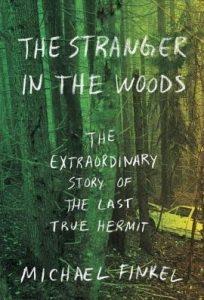Posted by Tom on Friday, May 12, 2017
The stranger in the woods: the extraordinary story of the last true hermit is about a man named Christopher Knight who chose to live alone for twenty-seven years in the woods of Maine. His camp was isolated enough to go unnoticed but near enough to other cabins that he could steal what he needed to survive.

There are so many fascinating parts to this story, but I don’t want to share too much because discovering the how and why of Knight’s life is largely what makes it worth reading. One thing: he claimed never to have built a fire. So surviving the winters wasn’t easy.
The book’s author, Michael Finkel, is such a compelling storyteller that he could write on almost any subject and I would read it. I read his True story: murder, memoir, mea culpa ten years or so ago. It’s about Finkel himself, a man accused of murdering his wife and children, and the two men’s relationship. I finished the book in the middle of the night after a couple hours of reading. I remember standing in front of the bathroom mirror and staring at myself trying to get the horror out of my head…but you should read it! ICPL no longer has a copy, so you’ll have to make an interlibrary loan request here.
Early in my reading of this book, I imagined Knight as a handsome idealist (like Emile Hirsch playing Christopher McCandless in Into the wild) following the road less traveled by. His project was awesome and noble and he was living true to himself. I’m not as introverted as Knight, so a month or two would do it for me, I thought. As I read on, I became more conflicted. What license does the inclination toward extreme introversion give a person? I’m not referring to his theft of nearby cabins, though that’s a worthy question. The burglarized cabins’ owners, by the way, ranged from being very sympathetic to Knight to feeling terrorized by him.
At what point does a natural inclination become pathological, and when is it appropriate for others to treat it that way? If Knight had secluded himself in an apartment in a city and had burglarized neighbors, would we see it differently? Of course we would. Though extreme solitude is suspect, it seems less so or not at all when it is directed at nature.
And what about his family? Knight had no contact with anyone and he never sought any. His parents and brothers had no idea where he was or if he was even alive. As a parent, I think of my own children and how difficult this would be. Your path is to live a life of solitude, you say? I will miss you, but it’s your life. You disappear and we never hear from you again? Well, that’s cruel. And yet, Knight’s family, like himself, is at the far end of the spectrum. They are inclined to be left alone.
We see a bit of Knight’s life in the book after his solitude is ended. He doesn’t die, but there is a death of a sort. I can’t imagine merely surviving and being in nature and that being enough. Then again, I can usually tolerate being around other people.



Comments
I heard about Christopher Knight a few months ago when he was featured on one of my favorite true crime podcasts, Sword & Scale. I recommend the podcast in general and the episode, which features three stories of criminals who seemed to drop of the face of the planet, including Ted Kaczynski. Here's a link to that ep.
http://swordandscale.com/sword-and-scale-episode-77/
This sounds very interesting...I'm grabbing an Express copy today. I've also ordered a copy of the author's previous book you mentioned, so patrons will be able to read it soon!
Great!
Add new comment